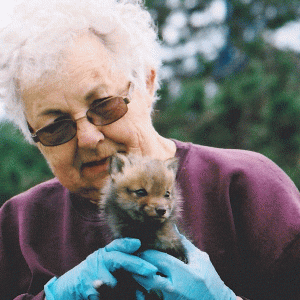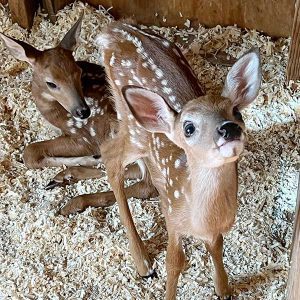I was planning to write about the two fawns at the Duckpond Wildlife Rehab Center, but after reading through some old columns written by Don’s late wife, Carleen, I was again moved by the years of dedicated, tireless — and often under-appreciated — commitment the Cotes have given to literally thousands of wild critters since they began to rehab (initially it was part-time) in 1964. Here we are, almost 60 years later, and Don continues to rescue and provide TLC to abandoned, injured, and sick animals. It’s truly mind-boggling to me, even as one who has loved animals since I was a young child.

In this Duck Pond Wildlife archive photo, Don’s late wife Carleen holds a baby fox
In 2010, Carleen wrote the following:
“When I wrote that first article [for The Town Line in 1996], we typically received fewer than 100 birds and animals a year. How times have changed! Since that first ‘Critter Chatter’ column, Donald has retired. We now receive between 350 to 400 mammals and birds.
“Our day starts about 6:30 a.m., when the alarm goes off. Donald prepares the bottles of milk to be fed to the fawns. I prepare the formula for the raccoons and other babies. Soon our much-valued volunteers arrive to help with feeding the babies that have begun stirring and crying for their milk. All want to be first! The floor of the living room is crowded with tubs where the babies live until they are big enough to go outside. We go from tub to tub, feeding the ones that scream the loudest.
“Even though they are hungry, some are reluctant and will eat only if I feed them. If they won’t eat, we have to guess about what could be the problem. Is the milk warm enough or do they not like the nipple? We re-warm the milk in the microwave. We pass the bottles back and forth until we get the nipple the baby will accept. It is frustrating trying to get the stubborn ones to eat.
“Other volunteers, meanwhile, are outside feeding the older babies — milk and bread for some, puppy food for others. Clover and dandelions and other greens are picked for the woodchucks. After Donald feeds the fawns, he prepares food for baby foxes, coyotes, and bobcats. Then, pens need to be cleaned, food and water dishes washed and disinfected, and fresh water provided before we can stop for lunch.
“At 1:00 p.m., it starts all over again! Donald feeds the fawns, the rest of us repeat the same scenario — feeding, changing soiled bedding, washing out the tubs, making formula, coaxing the reluctant ones to take the bottle, dispensing medications to those that need it.
“In addition, there is the special caring for the smaller, weaker babies in the incubators, feeding, cleaning the incubators, changing their towel bedding. There will be two to three more feedings before all settle down to sleep for the night. The soiled towels have piled up — seven to eight loads of laundry every day to be washing [sic], dried, and folded, ready for the next day.
“After the outside critters get their afternoon feedings and pens cleaned, it is finally time for volunteers to end their day with us. I will give another one or two feedings to the house babies. and Donald still has two more feedings for the fawns. We usually get our evening meal about 11:00 p.m. Last chores are accomplished at 1:00 a.m., and we get to bed between 2:00 and 3:00 a.m. As soon as our heads hit the pillows, we are asleep…oh, darn, that can’t be the alarm going off so soon!”

Two fawns recently cared for by Don (photo by Beth Comeau)
Although many critters are being transferred to other rehabbers, the daily chores and feeding schedules remain the same. Don has slowed down with age, but his commitment and that of volunteers Jane and Debbie are inspiring. Thank you to you all! Please check the following websites to see if there is a rehabber near you: www.mainevetmed.org/wildlife-rehabilitation or www.maine.gov/ifw/fish-wildlife/wildlife/living-with-wildlife/orphaned-injured-wildlife/index.html
Donald Cote operates Duck Pond Wildlife Care Center on Rte. 3 in Vassalboro. It is a nonprofit, State-permitted rehab facility, which is supported by his own resources and outside donations. Mailing address: 1787 North Belfast Avenue, Vassalboro ME 04989 Phone: (207) 445-4326. Please note that the prior wildlifecarecenter email address is no longer monitored.
—by Jayne Winters, Natural Resources Council of Maine member from South China, Maine
Critter Chatter also appears monthly in the Town Line newspaper.










Leave a Reply